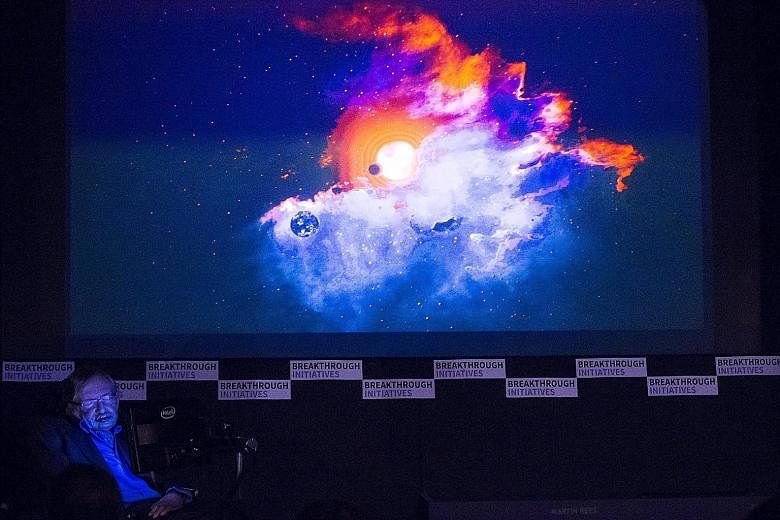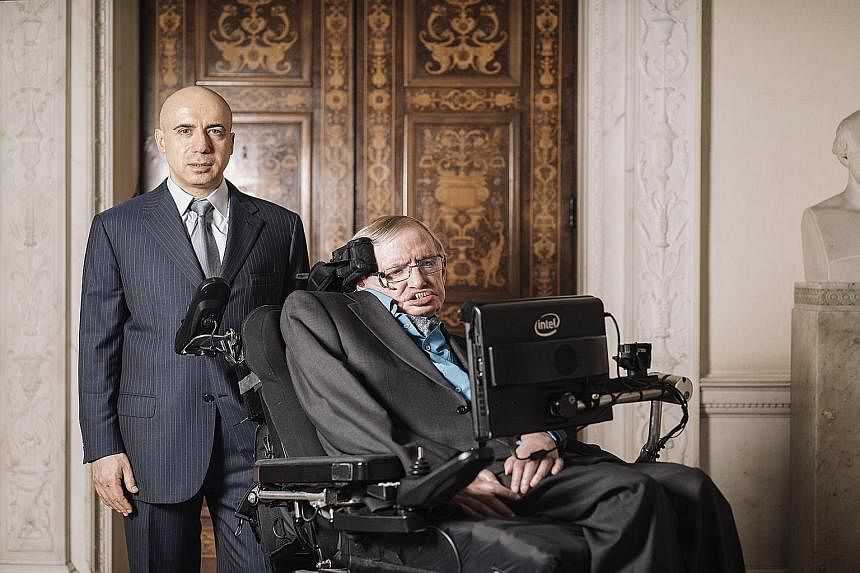LONDON • Scientists are about to embark on the biggest search yet for alien life, sweeping the skies for signals of civilisations beyond our solar system with US$100 million (S$137 million) from a Russian billionaire and the backing of physicist Stephen Hawking.
Whether we are alone in the universe has engaged minds down the ages, and the recent discovery there may be tens of billions of habitable planets in our galaxy alone has added urgency to finding an answer.
"There is no bigger question. It's time to commit to finding the answer - to search for life beyond Earth," Professor Hawking said at the programme's launch in London on Monday.
Some of the world's largest radio telescopes will listen to signals from the millions of star systems nearest Earth and the 100 closest galaxies.
Prof Hawking said that some form of simple life on other worlds seemed very likely, but the existence of intelligence was another matter, and humankind needed to think hard about making contact.
"A civilisation reading one of our messages could be billions of years ahead. If so, they will be vastly more powerful and may not see us as any more valuable than we see bacteria," he said.
The 10-year project, dubbed Breakthrough Listen, is funded by Russian Internet entrepreneur Yuri Milner, a physicist by training, who made his fortune from early investments in start-ups such as Facebook.
Mr Milner became fascinated by the notion of extraterrestrial life after reading astrophysicist Carl Sagan's Intelligent Life In The Universe as a 10-year-old in Moscow.
He believes other civilisations could teach us how to handle challenges such as allocating natural resources, he said.
And if we do not find them, we can learn other lessons.
The new project dwarfs anything else in the field, known by the acronym SETI for the "search for extraterrestrial intelligence".
Globally, less than US$2 million annually is spent on SETI, said Mr Dan Werthimer, an adviser to Mr Milner's project, and who also directs the SETI@home programme affiliated with the University of California, Berkeley.
Today, due to technology improvements, including in computing power and telescope sensitivity, US$100 million will go much further than in the early 1990s, the last time SETI had significant funding.
The advances allow scientists to monitor several billion radio frequencies at a time, instead of several million, and to search 10 times more sky than in the early 1990s.
Any signals detected will have been created years ago, perhaps even centuries or millennia earlier. Radio signals take four years simply to travel between Earth and the nearest star outside our solar system.
Project Breakthrough Listen will book time at radio telescopes, including at Parkes Observatory in Australia and the Green Bank Radio Astronomy Observatory in the US.
It will also hunt for light signals using a telescope at the Lick Observatory in California.
Mr Milner plans to book about two months a year at each site, a boon to scientists who normally might get two days a year on the telescopes.
The goal lies less in understanding the signals than in establishing whether they were created by intelligent life rather than by natural phenomena.
Scientists say the fact that humans have developed radio signalling makes it a good bet that others may use it as well.
"It doesn't tell you anything about the civilisation, but it tells you a civilisation is there," said Mr Frank Drake, another of the project's supporters.
REUTERS


